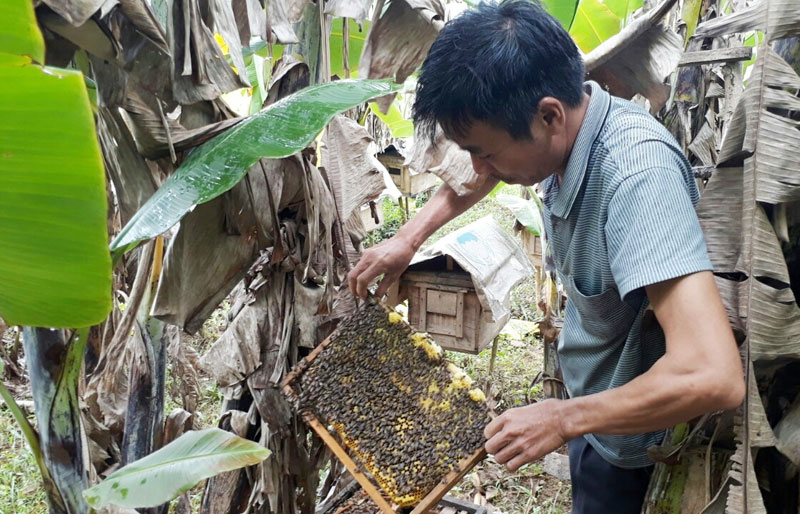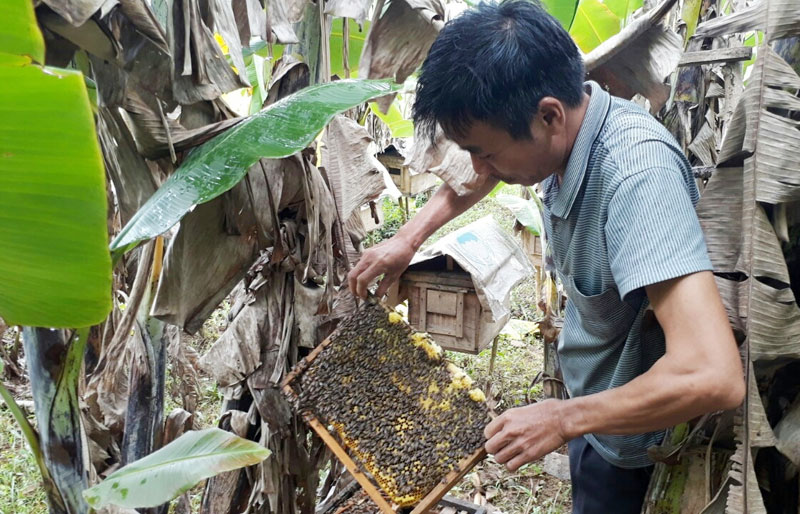
(HBO) - Taking advantage of available resources, in recent years, more and more households in Thuong Tien Commune (Kim Boi) have developed the career of beekeeping for honey and brought high economic efficiency

Mr. Bui Van Dao, in Luon village, Thuong Tien
commune (Kim Boi) is checking and monitoring honey bees.
Mr. Bui Van Dao's family is the first
household in Luon village to raise bees for honey. At first, he raised only for
family use or sold 1-2 bottles of honey. Recognizing the economic efficiency in
line with his conditions, he developed strong beekeeping work. Currently, he
has 300 herds of bees, each with 4 to 5 bee honey exploitation panels, in
addition, he also sells bee breed. "In the season of longan flowering, I
move the bees to the areas of various longan trees. I also placed more than 10
beehives on a forested area handed over for 50 years for bees to get the
natural forestry honey. Every year, I turn to get honey in 8 to 10 times, each
time with 300-400 liters, depending on the time. At the price of 160,000 VND /
liter, in 2018, I earned nearly 200 million VND "- Mr. Dao shared.
In recent years, the beekeeping career has
developed and expanded to some other villages. Ms. Bui Thi Ha's family in Vang
village started to raise bees from late 2017 with 30 herds. Despite new raise,
she can get the economic efficiency. She said that she had turned for honey 6
times, about 15 liters each. Raised bees are indigenous bees, clean honey,
because if plant protection drugs are used, bees will die or fly away.
Recognizing the advantages in honey bee
farming, some projects implemented in the commune have helped local people
develop beekeeping career. Ms. Dinh Thi Huong, Chairwoman of the Commune
Women's Union, said that from 2017, the Childfund project provided 15
households to get free- interest loans with a total amount of VND70 million
(five million dongs each) in the period of five years for bee growing. Just
over one year, the loaned households have grown to 105 more honey bee herds.
In the whole Thuong Tien commune, there are
more than 20 households raising bees with over 1,000 herds. Promoting the
advantages of being located in Thuong Tien Nature Reserve Zone, the commune has
the potential to develop bee keeping business with clean quality honey.
According to data from the Hoa Binh Provincial Party Committee, the industrial production index for the first six months of 2025 is estimated to have increased by 20% compared to the same period last year. This marks the highest year-on-year growth rate for this period since 2020.
In the first six months of 2025, Hoa Binh province’s export turnover was estimated at 1.145 billion USD, marking an 18.11% increase compared to the same period in 2024. Import turnover was estimated at $ 804 million, a 17.15% increase, which helped the province maintain a positive trade balance.
The lives of the ethnic minority farmers in Tan Lac district have gradually improved thanks to the new directions in agricultural production. This is a testament to the collective strength fostered through the professional associations and groups implemented by various levels of the district’s Farmers’ Union.
With the motto the "product quality comes first,” after nearly one year of establishment and operation, Muong village’s Clean Food Agricultural and Commercial Cooperative, located in Cau Hamlet, Hung Son Commune (Kim Boi district), has launched reputable, high-quality agricultural products to the market that are well-received by consumers. The products such as Muong village’s pork sausage, salt-cured chicken, and salt-cured pork hocks have gradually carved out a place in the market and they are on the path to obtaining the OCOP certification.
In the past, the phrase "bumper harvest, rock-bottom prices" was a familiar refrain for Vietnamese farmers engaged in fragmented, small-scale agriculture. But today, a new spirit is emerging across rural areas of Hoa Binh province - one of collaboration, organisation, and collective economic models that provide a stable foundation for production.
Maintaining growing area codes and packing facility codes in accordance with regulations is a mandatory requirement for agricultural products to be eligible for export. Recently, the Department of Agriculture and Environment of Hoa Binh province has intensified technical supervision of designated farming areas and packing facilities to safeguard the "green passport" that enables its products to access international markets.



